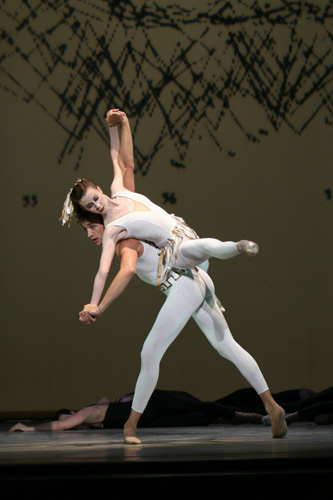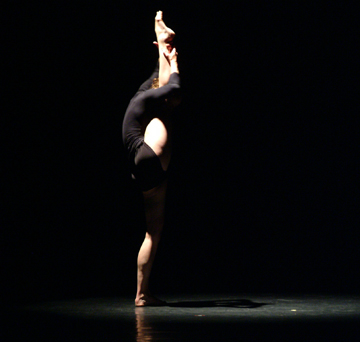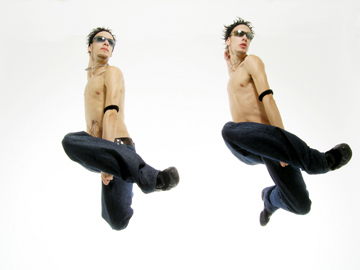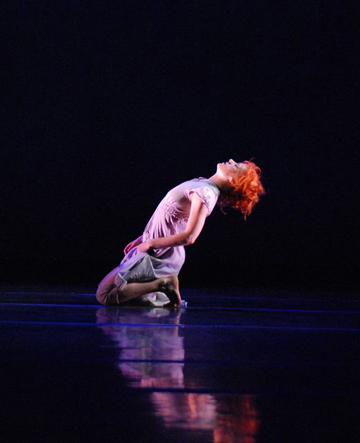|
 |
|
|
 |
 |
The attraction for this Fall for Dance program, the NY debut of DC-based Suzanne Farrell Ballet, was up first. But the curtain closer, Garth Fagan Dance, was not least, in terms of pleasure. The audience's infectious enthusiasm has been a Festival constant. The 1978 Fagan dance, aptly called "From Before" is to mesmerizing percussion in Ralph MacDonald's score. This is a joyful, rhythmic, and meditative African-modern fusion with some Caribbean cool. The motifs were best expressed in Nicolette Depass's flexed-footed walks and her solo of Island hip-rotations. Steve Humphrey's entrance drew total attention, and a pair in olive, Kaori Otana and Khama Phillips especially impressed September 25th. Fagan was trying to get at the essence of his roots. He was born in the West Indies and has based his company in Rochester, NY. His early choreography responded to his time. Later, interest in his work waned but he had amassed a faithful fan base. The company's new works were critically praised last year. Feel embarrassed if you've never seen them. Or look for them at the Joyce in November. Farrell, one of the finest 20th century ballerinas, reconstructed the little known Balanchine work "Pithoprakta," to introduce her decade old company, and its dedication to Balanchine. The dance is one of the twenty-plus ballets Mr. B made for her. The eponymous music by Iannis Xenakis is also little known, but easily appeals today, just as it inspired the choreographer fifty years ago. The fabulous décor (added by Farrell) is a projected section of Xenakis's unconventionally drawn score that looks like the music sounds. It's not an easy dance to warm up to. The lead couple Elisabeth Holowchuk and Mathew Prescott lacked chemistry September 25th. Was the movement designed for Balanchine's favored ballet body type? Is performing the way Balanchine would have wanted still possible? Holowchuk's line collapses when she stretches and supports her upward leg extension while turning in increments. Farrell had to fudge the male role and it shows, like fragments of a Greek urn glued together with the added, assumed pieces filled with putty rather than fakery. But in "Pithoprakta" a lovely formal narrative complements the mathematically derived music. Holly Hynes new costume designs help. The couple wears white unitards fit for Grecian heroes. At their feet, twelve rolling and crouching in fancy black leotards are a responsive chorus of movement. The viewer gets caught in the mass of a furtive run and then delights in discovering its choreographic sense. After this, Israeli Talia Paz performs an earnest solo from Sharon Eyal's "Love." Her movement is very flexible and sensuous compared to the lead Farrell pair. She cuts a Brancusi-like form in her unsupported, sky-high extensions. She pumps her pelvis, embarrassing a tittering pubescent boy in the audience. It's unusual for us to see a woman in such raw movement. Paz can lead the way. Never mind that the excerpt was too repetitive. So was its uninteresting, possibly undanceable, pop song by Lisa Germano. Paz and Eyal valuably broke the mold, that is, our preconceptions about women, body types, and Israeli contemporary dance. The Lombard Twins are an impressive Argentine pair of male identical twins who dance in absolute perfect tandem when they want to, which is most of the time in "Lombard Play Piazzolla— The Dance Concert." They are dressed alike and move with parallel inner kinesiology. They borrow a little hip-hop, and of course a little tango in their inventive dance that seems inspired by their unique twin condition. "LPP" is to the onstage Octavio Brunetti Tango Septet. A violin solo starts out interestingly but plays out flatly and without affect. Similarly the dance is big on speed and virtually passionless. We experience it more as a stunt or act. The one tango embrace is more like a tangle. My milonga friend usefully recalled that tango began as male power play. But Martin and Facundo Lombard are in perfect agreement, toppling that convention. Most of Kate Weare's dances have one word titles, but she calls this one "The Light Has Not the Arms to Carry Us." Is it about transience? With its simple, unpretentious movement language, it doesn't take itself too seriously. The dancers' visible energy fuels "The Light's" visceral power. Uncannily, so does Weare's sideways literal musicality. The excellent score is by Wolfgang Capellari and Gerard Pesson. Leslie Kraus dances the solo portion and Weare and Douglas Gillespie duet, ending with a meditative moment of closure.
 Suzanne Farrell Ballet
Dancers: Elisabeth Holowchuk and Matthew Prescott in"Prithoprakta"
Photo © & courtesy of Carol Pratt |
|
 Talia Paz Photo © & courtesy of Talia Paz |
|
 The Lombard Twins Photo © & courtesy of Cecilia Glick |
|
 Kate Weare Company Photo © & courtesy of Kurt Perschke |
|
 Garth Fagan Dance
Dancers: Norwood Pennewell and Nicolette Depass
Photo © & courtesy of Greg Barrett |
|
|
|






